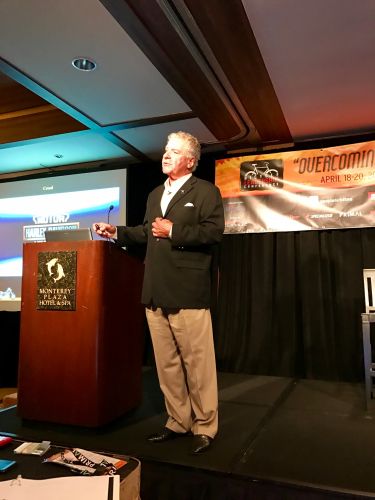MONTEREY, Calif. (BRAIN) — It was the last sentence in a magazine review of a Harley-Davidson motorcycle that caught Clyde Fessler's eye. The reviewer described riding a Harley as like riding a hog through a doorway.
Not a flattering review. But as Fessler likes to say, "If they turn right, we turn left." He took that reference to a hog, created a Harley-Davidson piggybank called the HOG, and sold more than 35,000 in a year.
Fessler joined Harley in 1977 and helped guide the company through a near-death experience — bankruptcy — into an iconic American company. As director of marketing, he took that image of a hog and later turned it into the Harley Owner Group (HOG) that now counts more than 1.2 million members.
As the first keynote speaker at the annual Bicycle Leadership Conference, Fessler said that Harley's image after World War II was one of riders who were bent on "rape, pillage and burn." The 1950s classic film "The Wild One" with Marlon Brando didn't help.
By the mid-1980s Harley was on the ropes. Quality was dismal. Prices were high. And Japanese competitors — Honda, Suzuki, Yamaha and others — were killing them in the market. They were introducing new models every year, their quality was high, they were selling lower-priced entry-level models and, more importantly, their dealers tended to be businessmen and not enthusiasts.
Fessler is considered by many as the marketing guru behind the dramatic turnaround of Harley-Davidson. He was recently inducted into the Black Hills Motorcycle Hall of Fame.
Over the years, Harley has built a professional dealer base. The company's Harley-Davidson University trains dealers to be financial managers and to use statistical analysis to manage their operations. The company has helped its dealers relocate their stores and build out operations that reflect their communities.
"We also contributed back to the community through Jerry Lewis' muscular dystrophy telethon. (Harley also has raised more than $70 million for MS.) That helped turn our image around from rape, pillage and burn," he said.
Fessler also helped lead the company into its highly successful clothing and accessory business. While at Harley he turned a laggard general merchandise and accessory business into a $200 million revenue generator. In five years, Fessler took clothing sales from $20 million a year to more than $100 million.
Fessler, who retired in 2002, acknowledged that sales have softened over the past year or so. And that was reflected in Harley's first-quarter report released earlier this week. Harley sales were down 4.2 percent worldwide compared with the same period last year, with U.S. sales off 5.7 percent.
Nonetheless, from Fessler's point of view it is people who drive businesses like motorcycles and bicycles. "It's passion that drives the whole thing," he said.


